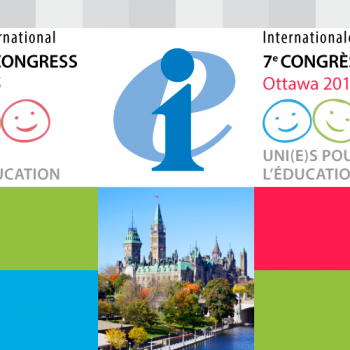All eyes on Ottawa as delegates of Education International World Congress “Unite for Quality Education”
This July, Canada will host the Education International (EI) World Congress in Ottawa. The Congress is held every four years, and is similar to the annual or biennial general meetings held by teacher organizations in Canada, though its scope is truly international. The Congress offers an opportunity to look with a wide lens at every level of education—early childhood, primary, secondary and tertiary—and to understand and make decisions about what teachers around the world believe about education, the rights of children and youth, and citizenship and democracy.
This Congress promises to be a one-of-a-kind, not only because it will not likely return to Canada for at least 50 years, but because of the economic and political environment in which both children and teachers find themselves in 2015. The Congress theme—an outgrowth of the EI global campaign—is UNITE for Quality Education. At recent international meetings, such as the International Summit on the Teaching Profession in Alberta in March, at the World Education Forum held in South Korea in May, and at other such meetings, there seems to be agreement among government and teacher union representatives, as well as non-governmental organizations and global institutions, that all children on the planet should experience quality education, that education is the key to ending poverty, and that an educated population brings great social and economic dividends to any nation.
However, there is not yet a shared understanding about what quality education looks like. At times, the definition of quality education seems to veer dangerously towards an instrumental view of education and of people. According to this view, the purpose of education is solely to prepare children for their future work, and the role of a nation’s people is to participate individually in the economy. Typically, then, governments want the desirable products (in instrumental language) of education. Further, many governments are caught up in the politics of austerity, and seek to obtain those products at the lowest possible cost, based on the belief that the role of government should be small, individual citizens should be entirely responsible for their own well-being, and public services should be in private hands. This belief has been advanced by private interests and the politicians they support for decades, and has traction among some national governments. Where these beliefs have been either fully or partially implemented, the result has been an increase in the gap between the rich and the poor—a fact that has been noted repeatedly and with concern by the Organization for Economic Co-operation and Development and also in the Toronto Dominion Economic Special Report of November 2014.
One example of this approach is the low-fee for-profit school model that is currently prevalent in Africa. What it means in practical terms is that, when students arrive at school in the morning, they must pay a fee to go to school. No fee, no school that day. Children have gone to work so they can make enough money to go to school. Their desire to learn has become a source of profit for private managers and investors.
Through the voice of EI, the world’s teachers offer a very different vision of quality education—a vision articulated in the UNITE for Quality Education campaign, a vision that forms the framework for the 2015 EI World Congress. The UNITE campaign focuses on three things: quality teachers, quality tools, and quality learning environments. Teachers should be well-qualified and experience on-going professional growth. Teachers and students should have the resources they need to teach and to learn. Schools and classrooms should be safe and well-equipped, and the conditions conducive to teaching and learning. EI places the responsibility for providing this education system squarely on the shoulders of governments because that is the only way to ensure that every child has an equitable opportunity to develop their full potential through education. It is a holistic view, and a view oriented towards building, not just economic participation, but citizenship and democracy.
At the EI World Congress this summer, teacher leaders from all over the world will discuss these very issues, in all of their many dimensions. We will be formulating policy, electing leadership, making plans, and setting EI’s organizational goals for the next four years. We will certainly be working together to ensure that education in our world is publicly-funded, public, universal, free, inclusive, for the benefit of all children, their families, their communities, and our beautiful world.


